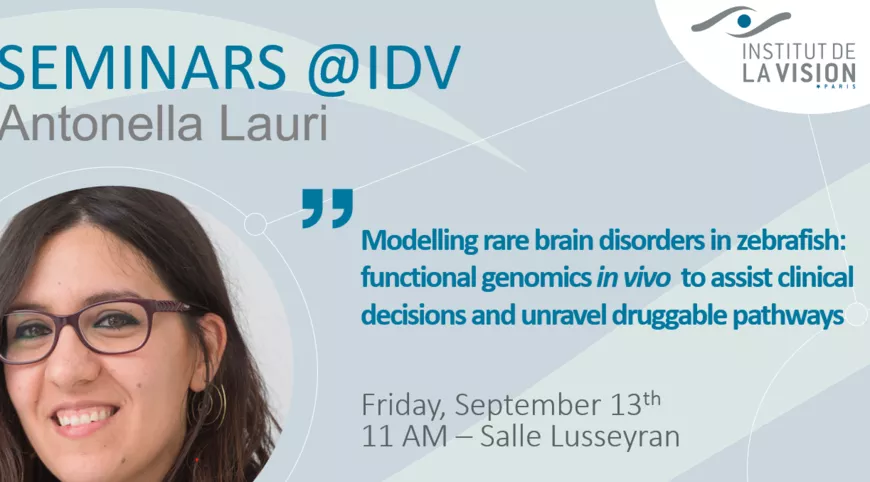Modelling rare brain disorders in zebrafish: functional genomics in vivo to assist clinical decisions and unravel druggable pathways
Invited by Filippo Del Bene, Antonella Lauri (Children’s Hospital Bambino Gesù -Rome, Italy), will speak on friday September 13th at 11 am. Meet in the Lusseyran meeting room.

Abstract
Despite revolutionary Next Generation Sequencing (NGS) technologies becoming more affordable and implementable, yet numerous rare patients remain “invisible” with no clear diagnosis nor cure. To solve this huge burden, priority of EU health policies, the speed and accuracy reached in the identification of likely pathogenic variants in human genome must be matched by dedicated functional genomics approaches in valid model organisms to dissect the actual impact of the variants on whole-organism development and provide genotype-phenotype correlation. Such research pipelines in vivo can boost patients’ stratification, assist clinical decisions and generate tools for mechanism search across scales (from molecules to whole organism) towards early disease targets identification. They also offer a unique opportunity to discover gene functions, pathways and developmental processes.
In my talk, I will present the overall goals and tools of our functional genomics pipeline recently established to tackle rare and ultra-rare encephalopathies using zebrafish as model organism and how it integrates within a large clinical and multi-approach research workflow. I will discuss results obtained in the last two years by gene manipulation, reporter systems and morpho-functional characterization in fish that allowed us new disease-genes discovery and functional validation of candidate mutations affecting organelle homeostasis and causing malformations of cortical development (MCD) that we can now diagnose. I will also focus on our recent efforts to model a rare progressive motor neuron disease (MND) affecting cytoskeleton dynamics, map the earliest signs of the disease and obtain addressable mechanistic insights for future treatment evaluations.
About Antonella Lauri
Antonella Lauri is a Principal Investigator at Children’s Hospital Bambino Gesù (Rome, Italy). Her current work integrates in vivo genetic modeling of currently poorly diagnosed pediatric diseases and multi-level analysis from subcellular to behavioral characterization in zebrafish, with a special focus on early developmental events and disease signs. The mail goal of her research activity in zebrafish is to offer a organismal-based platform within the clinical settings to i) speed up the functional validation of candidate pathogenic variants from undiagnosed patients with neurodevelopmental disorders and ii) generate resources to investigate unknown patho-mechanisms underlying brain malformations and early onset neurodegenerative conditions. These will be necessary to inspire targeted therapies.
Antonella obtained her PhD in 2013 studying comparative genetics, body plan and nervous system evolution at EMBL (Heidelberg, Germany). Fascinated by the possibilities offered by aquatic model systems for basic and translational questions and emerging imaging technologies she was was enrolled in the Helmholtz Munich postdoctoral program for talented early career scientists (Germany) and teamed-up with physicists and engineers to establishing pipelines for examining cognitive abilities in teleost fish and brain activity in zebrafish. In 2019 she received a Marie Skłodowska-Curie fellowship with the seal of excellence to transfer and apply zebrafish-based technologies to advance translational research in rare diseases at Children’s Hospital Bambino Gesù.
